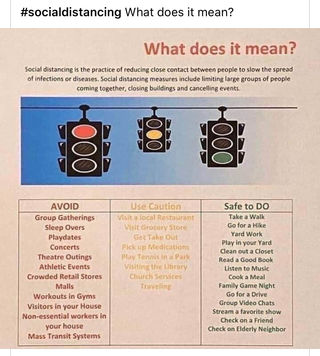Coronavirus Disease 2019
Social Distancing Sucks, But We Should Do It Anyway
How to maintain your mental health while social distancing and self-isolating.
Posted March 15, 2020 Reviewed by Lybi Ma
Are you stuck at home with unruly kids? Trying to concentrate during a “virtual” meeting? Or frustrated that even though you have no symptoms you’re supposed to self-isolate for 14 days?
The social distancing and self-isolating measures as part of the response to COVID-19 are annoying. They just are. They are disruptive and stressful and frustrating. Why should we do it?
For most of us this illness will be mild (80% of us in fact) but as someone who works in the surgery and cancer care unit of a tertiary care hospital, all my patients are immune comprised and I'm very worried for them. So if you're doing social distancing or self-isolating, on some level you've decided to protect those who are more vulnerable than you. Maybe it’s for an elderly parent or neighbour. Maybe for a friend or family member who is immune compromised or has an underlying condition. Even if you know no one at risk you’re doing an amazing thing by protecting those who are most vulnerable at considerable frustration and annoyance for you. So remind yourself and keep reminding yourself why you’re doing this: because you are a kind, compassionate human who has chosen to to care about other humans, who through no choice of their own, are very much at risk.
There's also very good scientific evidence that social distancing makes a huge impact on the transmission and death rates in COVID-19. It’s estimated 26 percent of transmissions happen before people have symptoms and that we can decrease the death rate by a factor of 10 by employing social distancing measures at a large scale.
Here's the article explaining the benefit of social distancing measures:
Social distancing works to “flatten the curve” or in other words to slow the transmission of the disease so the healthcare system is not overwhelmed. This saves lives because patients can get the treatment they need and be more likely to survive the illness.
Here is a great article explaining how to "flatten the curve":
If you are social distancing or self-isolating, good work. Well done on protecting the health of your loved ones and those in your community. We need a global communal effort to manage this disease.

But humans are social creatures and being isolated can be hard on your mental well-being. Here are some things you can do to maintain your mental well-being while following COVID-19 recommendations.
1. Create a routine
Make yourself a daily schedule and try to follow it. Get up at a regular time. Take time to get showered and get dressed. Have a regular lunch break. Include some physical activity, perhaps going outdoors or follow a workout online.
2. Find a sense of purpose or meaning
If you are working from home, try to keep your deadlines and tasks you might typically do. Find other activities to do that feel purposeful. Clean a closet. Send an email to a friend. Support friends or neighbours who are self-isolating by offering to get them supplies or groceries if you are not required to self-isolate.
3. Stay connected with others
Social distancing really means physical distancing. We are very fortunate to live in a world where we can stay connected via technology. Have some Facetime conversations. Let your kids play online video games with their friends. Text your friends and family. Join a Facebook group that is unrelated to COVID-19.
4. Limit time-consuming information on COVID-19.
Our “caveman” brains often want more information, telling us that if we just get enough information we can “solve” this problem and feel less anxious. But, of course, most of COVID-19 is out of our control. We can control whether we wash our hands, but we don’t control whether our immune system can effectively fight COVID-19. Try to give yourself a mental break by thinking about something other than COVID-19. Watch a Star Wars marathon. Try a new cooking show. Try sudoku. Take up knitting or learn a new language. Give your brain something else to think about besides COVID-19, taking a “mental” break from the stress.
5. Make sure you’re charging your frontal lobe.
Because of ongoing stress, our caveman minds are “on fire” and most of us are experiencing higher levels of anxiety. Our frontal lobe is capable of controlling our behaviour but it is like a battery and as we use it to get through our day, the battery gets drained. Make sure to include activities in your day that “recharges” your frontal lobe battery. Activities that make you feel more energetic, purposeful, accomplished, engaged, or that make you smile. Watch your favourite movie, call or text a good friend and have a laugh, meditate, take a bath, snuggle with your dog.
6. Remind yourself you’re not alone.
If you’re social distancing or isolating it can feel, well, isolating. Millions of years of evolution have shaped humans to feel distress when we are alone. It says something about our species that solitary confinement is a source of punishment. This is a global response and everyone on the planet is working toward the same goal. Your actions are contributing to the well-being of your community, city, country, and world. This a wonderful, compassionate act you are doing to support others. And many others are doing the same thing for you. We are truly in this together, even if you’re home alone and it sucks.




